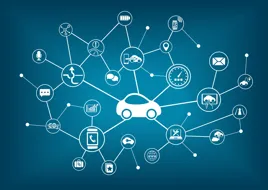ALMOST THREE OUT OF FOUR COMPANY CAR DRIVERS READY TO CONNECT WITH THEIR VEHICLE, ALD AUTOMOTIVE RESEARCH FINDS
Latest research of over 520 company car drivers from ALD Automotive has found that fleet drivers are increasingly welcoming connected cars despite growing concerns over the risks of distracted driving.
The latest survey of business drivers across the UK by ALD, one of the UK’s largest vehicle leasing and fleet management providers, has found that over seven out of ten company car drivers believe they would benefit from connected car technology. This compares to six out of ten a year ago, when drivers expressed concerns about the safety implications as well as the cost and the intrusion on their private lives, and suggests that as the technology becomes more commonplace, drivers’ fears are being allayed.
The research comes as industry analysts suggest that there will be 80bn connected devices by 2020 – equivalent to 500 devices per square km – and indicates that younger drivers are more convinced of the benefits of the technology, with over eight out of ten of those aged 35 and under welcoming connected cars in the ALD survey, dropping to seven out of ten for drivers in the 36+ age group.
Over one third of respondents saw the main benefits as being traffic updates, dynamic route guidance and accident alerts, with message narration, local amenities reporting and vehicle service reminders/booking facility seen as other primary benefits. More than half of those respondents in favour of the connected car saw all of these options as a benefit.
Safety features were also seen as a key advantage of connected cars. Over 70% of ALD Automotive’s drivers said they were happy for their vehicle to send an initial notification to emergency advisors for assistance. In the UK, Vauxhall have already implemented such technology via ‘Onstar’ while the eCall system is set to become mandatory on all new cars and vans from 2018.
Maintenance and repair capabilities also proved popular with drivers. Almost 70% were in favour of having an app that would give information on the progress of a vehicle repair, similar to tracking a parcel delivery.
Rhys Harrhy, Telematics Product Manager, says: “ALD has been at the forefront of ‘The Connected Vehicle’ for over a decade with its in-vehicle telematics solution, ProFleet2.
“Launched in 2004, it helps drivers to manage expenses, as well as accurately predicting servicing and maintenance schedules.”
The survey’s findings are released as safety organisations highlight the safety risks of connected car technology. This includes Brake, who are campaigning to extend the mobile phone ban to include hands-free devices. Interestingly, only a third of the drivers in the ALD Automotive research agreed with this, which fits in line with fleet drivers’ higher acceptance and usage of in-car technology.
Harrhy continues: “’The Connected Vehicle’ was a new concept for most drivers in 2004, with privacy the primary concern. However, people’s attitudes have changed. Drivers now see this technology as improving their overall driving experience rather than something that is looking over their shoulder. The fleet market has also evolved, with organisations looking at compliance, cost reductions, management of risk, control of CO2 emissions and fuel efficiency. Fleets realise that they are putting a lot of work into structuring their fleets appropriately, but are not able to manage that investment and value once the vehicles were delivered, without systems like ProFleet2.”
Looking to what the future holds, Harrhy adds: “There’s no doubt that the technology will get cheaper, more powerful and more flexible, and that there will be a greater convergence of technology. We can expect vehicle-to-vehicle and vehicle-to-infrastructure communication – allowing drivers to automatically avoid traffic blackspots and fleet managers to plan more effectively.”
"Telematics really is coming of age and able to offer practical solutions to real issues that these managers and drivers are facing. The data that telematics provides will continue to give the hard evidence and clear insights that organisations need to make decisions – both for the fleet and to help individuals."

















